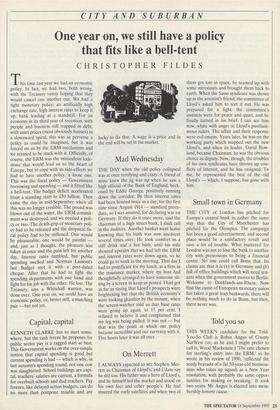Mad Wednesday
THE DAY when the old policy collapsed was at once terrifying and crazy. A friend of mine knew the jig was up when he saw a high official of the Bank of England, beck- oned by Eddie George, positively running down the corridor. By then interest rates had been hoisted twice in a day, for the first time since August 1914 — standard proce- dure, so I was assured, for declaring war on Germany. If they do it once more, said the chairman of a high street bank, I shall call in the auditors. Another banker went home knowing that his bank was now insolvent several times over. He took comfort in a stiff drink and a hot bath, until his wife shouted upstairs that we had left the ERM and interest rates were down again, so he could go to work in the morning. That day I had to pontificate for my lunch, at a firm in the insurance market, where my host had thoughtfully arranged to have someone sit- ting by a screen to keep us posted. I had got as far as saying that Lloyd's prospects were brightening but that the British economy's were looking ghastlier by the minute, when the screen-watcher told us that base rates were going up again, to 15 per cent. I refused to believe it and complained that my leg was being pulled. It was not — but that was the point at which our policy became incredible and our currency with it. Five hours later it was all over.


































































 Previous page
Previous page